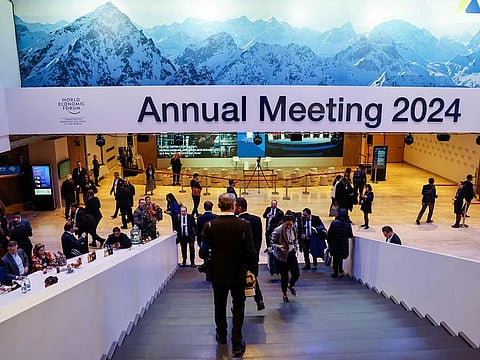Sustainable growth, AI, and peace: UAE’s triple triumph at Davos 2024
The WEF unites movers and shakers for impactful global ideas

The headquarters of the World Economic Forum (WEF) is a three-floored glass mansion located in a suburb of Geneva, entirely invisible from the road outside the gate that leads to it. On the other side of the glass mansion is an exquisite Japanese garden overlooking a lake.
When I joined as an employee at the WEF exactly 13 years ago, the intrigue and power reflected in my workplace seemed to me to also represent the public perception of the WEF’s mission and work.
My visits to the Middle East to meet with the WEF’s active community of regional government leaders and prominent private sector chief executives in the UAE were the most frequent.
Further, the WEF team would travel every year to the UAE for the Annual Meeting of the WEF’s Global Future Councils, a crucial network of thought leaders from across the world brought together at a meeting that has been hosted by the UAE since the start.
More recently, since 2019, the UAE has also hosted one of the WEF’s 16 Centers for the Fourth Industrial Revolution. During the 2023 Annual Meeting of the World Economic Forum, His Excellency Mohammad bin Abdullah Al Gergawi, UAE’s Minister of Cabinet Affairs, joined the WEF Leadership Council, an important group that includes only 13 members from various countries.
Last week at the 2024 Annual Meeting of the WEF in Davos, there were at least 3 themes that made the UAE more prominent than ever.
One is sustainable growth, an area where the UAE has sprang into action and has quickly taken the clear lead in the region. The second is Artificial Intelligence (AI) — The UAE’s emphasis in leveraging AI across industry and governance is aligned with the WEF’s discourse on the Fourth Industrial Revolution.
Pro-climate and pro-growth
This is the year that the most number of people will vote than in any other year in the history of the world and leaders at Davos were split around how AI could either be a real force for good or a source of major misinformation. The third theme that put the spotlight on the UAE, is peace.
At the Annual Meeting as well as on the Promenadenstrasse outside the WEF’s conference centre, peace for Ukraine was a prominent theme. However, conversations about regional peace in the Middle East involving the region’s leaders were in full strength too within diplomatic backchannels at Davos this year.
All these 3 themes — sustainable growth, technology & AI, and peace — come together in the UAE. Indeed sustainable growth in the UAE is characterised by innovation and the usage of new technologies such as AI as well as stable governance.
Recently I was assessing the Middle East and Africa’s most sustainable companies, and the common factor across companies in all sectors in the UAE is the companies’ courage to come up with innovative solutions that are both pro-climate and pro-growth.
Strides towards sustainable growth
For example, Aldar stands out among construction companies globally with its detailed plan to reach net-zero emissions to achieve 90% reduction in its Scope 1 & 2 emissions and a 45% reduction in Scope 3 emissions intensity by 2030. Another example is in the UAE’s financial sector, where Emirates NBD launched digital-first banks and its debit card is made from 85% recycled PVC from production waste! Also, one of the first Carbon Capture and Storage facilities in the Middle East has been established by ADNOC in the UAE.
In the future, the sustainable growth of the UAE’s economy will increasingly be underpinned by the sustainable lifestyles of its people. There is already a strong emphasis on sustainable infrastructure and usage of sustainable materials in the country.
Further, the recent cabinet reshuffle in the first week of 2024 resulted in Dr Amna bint Abdullah Al Dahak Al Shamsi, formerly from the UAE’s Ministry of Education, becoming the Minister of Environment of the UAE, thereby pointing towards the increased importance that environment-related education will play in the country. The incorporation of a green learning curriculum within existing school, university, and executive education in the UAE will lead to consumer demand for more sustainable products and services.
The UAE’s strides towards sustainable growth shares its vision with the WEF’s emphasis on future-proof industries for the 21st century. It is no wonder therefore that the representation of the UAE at Davos strengthens each year. The large representation of more than 100 leaders from the UAE at Davos this year has been impressive and so has the UAE pavilion on the Promenadenstrasse, which aptly displayed the theme that indeed ‘Impossible is Possible’ here.
Dr Miniya Chatterji is the Chief Executive Officer, Sustain Labs Paris
Sign up for the Daily Briefing
Get the latest news and updates straight to your inbox



